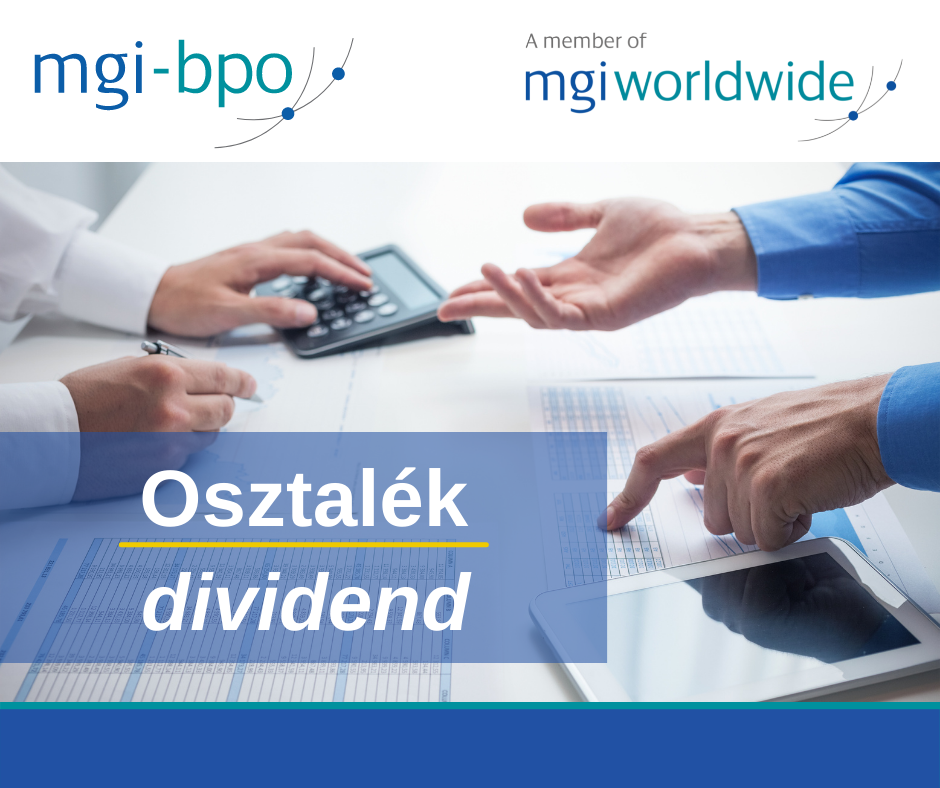
Difference between final dividend and interim dividend
After approving the annual or abbreviated annual financial statements, the members of a company decide on the use of the after-tax profit. The members may decide that they do not want to pay after-tax profits as dividends and place them in the retained earnings. However, they may also decide that the after-tax profit and/or the profit placed in the retained earnings in previous years will be paid as dividends. The members may decide on dividends once, immediately after the approval of the financial statements. The decision on the dividends shall be deposited with the approved financial statements and, if an auditor has been elected, with the auditor’s report.
A company can only pay interim dividend to its members during the year. Interim dividend payment may be declared based on an interim balance sheet. If a company is subjected to an audit, the interim balance sheet must be reviewed and reported by an auditor. If interim dividend payment is not supported by an interim balance sheet or the audit has not been performed, it cannot be considered as an interim dividend. It is not necessary to publish the interim balance sheet.
Taxes on dividends
Dividends paid to a private individual in the tax year 2021 are subject to a 15 percent personal income tax and, to a certain extent, a 15.5 percent social contribution tax.
In the case of dividends paid to a private individual in Hungary, the payer must allocate and deduct the personal income tax and, where applicable, the social contribution tax on the date of payment of the dividend, pay them until the 12th of the month following the date of payment and provide data thereof to the Hungarian tax authority in return No.08.
In the case of dividends from a company that is not a payer (typically a foreign company), personal income tax and social contribution tax are allocated by the private individual in his/her tax return and paid by the deadline for filing the return.
Obligation to pay social contribution tax
Upon payment of dividends, beside a 15 percent personal income tax, social contribution tax is also to be paid on dividends from 1 January 2019 until the amount of total income subject to social contribution tax is 24 times the minimum wage. For the calculation of the social contribution payment ceiling, the total amount of all income that is subject to social contribution payment under the new Social Contribution Tax Act (wages, shareholder’s income, income from renting out real estate, dividends, etc.) can be taken into account. Above the cap, only 15 percent personal income tax is payable on dividends.
On January 1, 2021, the minimum wage amounted to HUF 161,000.
24 times the minimum wage is HUF 3,864,000, so the payment obligation is HUF 598,920.
Tax on interim dividends
The payer must deduct 15 percent personal income tax from the interim dividends paid to private individuals.
While final dividends and their tax are to be declared in the tax return for the year of payment, interim dividends and their tax are only to be shown as “memo item” in the tax return for the year of payment. The payer shall declare the approved dividend in the tax return for the year in which the financial statements allocating the dividend is approved, considering the tax paid as a deduction from the interim dividends.
Obligation to pay social contribution tax
No social contribution tax is to be deducted from the interim dividend; the tax shall be allocated when the interim dividend becomes final dividend. If it is not possible to deduct social contribution tax, the private individual is obliged to allocate and pay the tax.
Example of accounting for interim dividend
A company has only private individual members. The members did not file a declaration regarding the social contribution tax. A decision was made to pay dividends of HUF 10 million in 2020, which is possible based on the interim balance sheet. This is how to account for the interim dividend:
| gross amount: | HUF 10,000,000 |
| deducted PIT (to be paid to NAV): | HUF 1,500,000 |
| net amount to be paid: | HUF 8,500,000 |
The dividend approved with the 2020 financial statements is HUF 20 million.
| gross amount: | HUF 20,000,000 |
| deducted PIT on interim dividend that has become final: | HUF 0 |
| deducted PIT (to be paid to NAV): | HUF 1,500,000 |
| deducted social contribution (to be paid to NAV): | HUF 598,920 |
| net amount to be paid: | HUF 7,901,080 |
Accounting for interim dividend that has not become final
If a dividend lower that the interim dividend paid is approved based on the financial statements for the financial year concerned, all or part of the interim dividend previously received will not become final but will be a loan. Interest calculated based on the period between the date of payment of the interim dividend and the date of the decision on the final dividend is income from interest rebate.
If the interim dividend received or part of it does not become final dividend and does not have to be repaid, the part remitted becomes other income of the private individual. This income shall be declared in the tax return for the year of the remission.
Taxes on final and interim dividends in case of SBT
The subjects of small business tax (SBT), unlike the corporate income tax subjects, pay tax on the profit only if it is deducted from the business. However, SBT payment will be different from personal income tax liability. This is because SBT is not to be paid on the date of payment of dividends, but – based on the decision of the members of the company on the dividend – it must be included in the annual SBT return and paid then. This also means that no SBT is payable on interim dividends paid during the year. Only on allocated dividends shall SBT be paid. It is logical given the fact that interim dividends paid during the year become final if the company’s earnings provide cover for them.
If the dividend is paid only later, after the decision of the dividend, SBT will still have to be paid. In this case, the SBT payment will precede the personal income tax liability.



